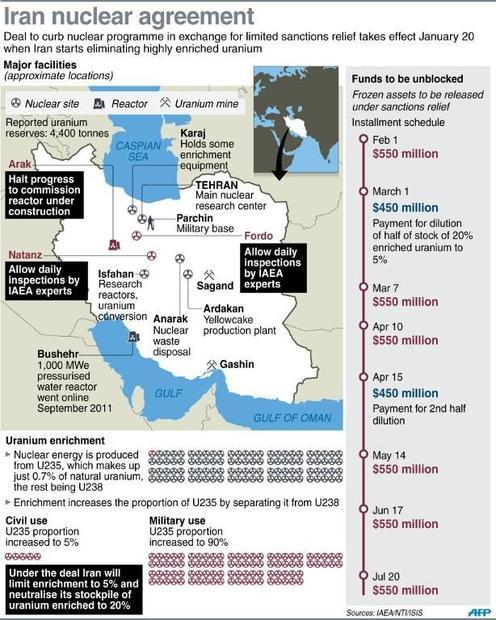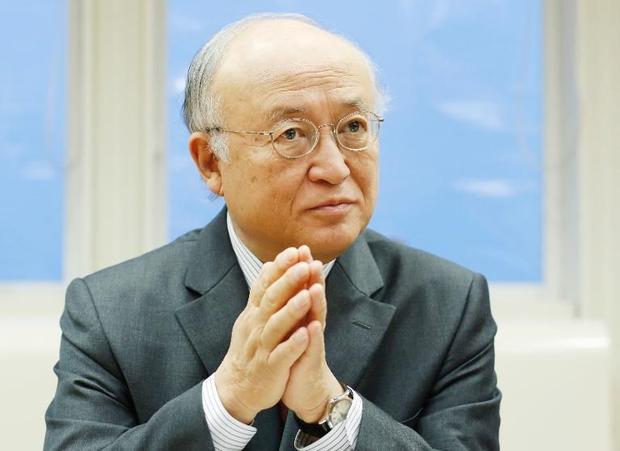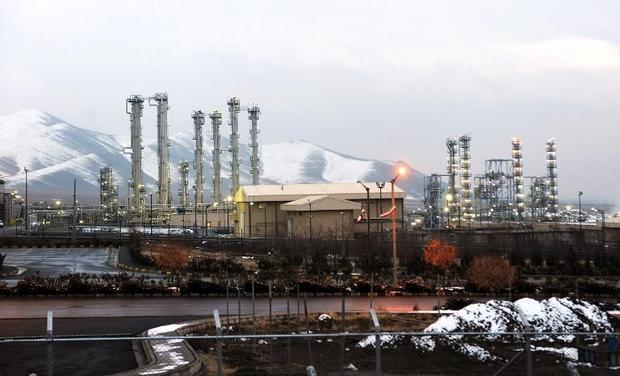Iran said talks Saturday with the UN atomic watchdog over allegations of Tehran's past weapons work and additional safeguards were constructive and have been extended for another day.
The five-hour-long meeting came as the Islamic republic's supreme leader, Ayatollah Ali Khamenei, demanded tolerance from critics of President Hassan Rouhani ahead of fresh talks with world powers.
Negotiations between Iran and the Vienna-based International Atomic Energy Agency (IAEA) are building on a framework deal agreed in November that requires Tehran to take six practical steps by Tuesday.
Chief inspector Tero Varjoranta and four experts are assessing the implementation of those measures, Iranian Atomic Energy Organisation spokesman Behrouz Kamalvandi said.
The official IRNA news agency quoted Kamalvandi as saying that the talks were "good, constructive and are progressing".
He said both side had agreed to continue the talks on Sunday, which are expected to include long-standing allegations of "possible military dimensions" to Iran's past nuclear activities.
IAEA director general Yukiya Amano told AFP last month that time was now ripe to ask the "more difficult" questions.
How long this takes "very much depends on Iran. It can be quick or it can be long. It really depends on their cooperation," Amano said.
Another issue to be discussed is access to the Parchin military facility, suspected of having been used for research pertaining to weapons development prior to 2003, and possibly since, according to the IAEA.
The November deal, struck after two years of on-off talks, was separate from a landmark agreement reached with world powers the same month that has placed temporary curbs on Iran's nuclear activities.
Implementation of the IAEA deal began in December, when inspectors visited Arak, where the small unfinished heavy water reactor has been hit by delays.
The site is of international concern because Iran could theoretically extract weapons-grade plutonium from spent fuel if it also builds a reprocessing facility.
Iran says it will continue work there but its atomic chief Ali Akbar Salehi said this week the reactor could be modified to produce less plutonium to "allay the worries."
The second step was to visit the Gachin uranium mine, which took place in late January.
Also required were information on future research reactors, identifying sites of new nuclear power plants, and clarification on Iranian statements regarding additional enrichment facilities and laser enrichment technology.
All six measures have been implemented.
'Tolerance' demanded for Rouhani
The IAEA talks are running in parallel with efforts by the so-called P5+1 group of world powers seeking a comprehensive accord with Iran that would once and for all resolve the decade-long impasse over its nuclear work.
Full cooperation with the IAEA is a key demand of the P5+1 -- Britain, China, France, Russia, the United States and Germany.
Under the deal, Iran has stopped enriching uranium to medium levels and is converting its current stockpile into a form much more difficult to process into weapons-grade material.
In exchange, it has received limited relief from punishing sanctions which have hard hit its economy.
But the Rouhani government has faced increasing public opposition from establishment hardliners over the deal.
They argue that what Iran gained in the interim deal -- meant to last six months and buy time for diplomacy over a comprehensive accord -- does not offset what it has compromised in its nuclear activities.
Rouhani insists that the deal is bringing down the sanctions regime -- a main campaign promise of the self-proclaimed moderate, who took office in August.
Without touching directly on the nature of the dispute, Khamenei demanded tolerance from the deal's opponents and renewed his confidence in Rouhani.
"Critics must exercise tolerance when it comes to the government," he told air force commanders in remarks reported by one of his websites, leader.ir.
"It has only been a few months since the government has taken the reign," he said. "The statesmen must be given time to push forward strongly with their plans."
Khamenei -- who has final say on all key state affairs, including the nuclear dossier -- himself hailed the deal as a victory for Iran, but remains sceptical of interaction with longtime foe the United States.
Tehran will renew talks with the P5+1 on February 18 aiming at a final deal that will allay the fears of Western powers and Israel that Iran's atomic work masks military objectives, and remove sanctions on Tehran.
Iran said talks Saturday with the UN atomic watchdog over allegations of Tehran’s past weapons work and additional safeguards were constructive and have been extended for another day.
The five-hour-long meeting came as the Islamic republic’s supreme leader, Ayatollah Ali Khamenei, demanded tolerance from critics of President Hassan Rouhani ahead of fresh talks with world powers.
Negotiations between Iran and the Vienna-based International Atomic Energy Agency (IAEA) are building on a framework deal agreed in November that requires Tehran to take six practical steps by Tuesday.
Chief inspector Tero Varjoranta and four experts are assessing the implementation of those measures, Iranian Atomic Energy Organisation spokesman Behrouz Kamalvandi said.
The official IRNA news agency quoted Kamalvandi as saying that the talks were “good, constructive and are progressing”.
He said both side had agreed to continue the talks on Sunday, which are expected to include long-standing allegations of “possible military dimensions” to Iran’s past nuclear activities.
IAEA director general Yukiya Amano told AFP last month that time was now ripe to ask the “more difficult” questions.
How long this takes “very much depends on Iran. It can be quick or it can be long. It really depends on their cooperation,” Amano said.
Another issue to be discussed is access to the Parchin military facility, suspected of having been used for research pertaining to weapons development prior to 2003, and possibly since, according to the IAEA.
The November deal, struck after two years of on-off talks, was separate from a landmark agreement reached with world powers the same month that has placed temporary curbs on Iran’s nuclear activities.
Implementation of the IAEA deal began in December, when inspectors visited Arak, where the small unfinished heavy water reactor has been hit by delays.
The site is of international concern because Iran could theoretically extract weapons-grade plutonium from spent fuel if it also builds a reprocessing facility.
Iran says it will continue work there but its atomic chief Ali Akbar Salehi said this week the reactor could be modified to produce less plutonium to “allay the worries.”
The second step was to visit the Gachin uranium mine, which took place in late January.
Also required were information on future research reactors, identifying sites of new nuclear power plants, and clarification on Iranian statements regarding additional enrichment facilities and laser enrichment technology.
All six measures have been implemented.
‘Tolerance’ demanded for Rouhani
The IAEA talks are running in parallel with efforts by the so-called P5+1 group of world powers seeking a comprehensive accord with Iran that would once and for all resolve the decade-long impasse over its nuclear work.
Full cooperation with the IAEA is a key demand of the P5+1 — Britain, China, France, Russia, the United States and Germany.
Under the deal, Iran has stopped enriching uranium to medium levels and is converting its current stockpile into a form much more difficult to process into weapons-grade material.
In exchange, it has received limited relief from punishing sanctions which have hard hit its economy.
But the Rouhani government has faced increasing public opposition from establishment hardliners over the deal.
They argue that what Iran gained in the interim deal — meant to last six months and buy time for diplomacy over a comprehensive accord — does not offset what it has compromised in its nuclear activities.
Rouhani insists that the deal is bringing down the sanctions regime — a main campaign promise of the self-proclaimed moderate, who took office in August.
Without touching directly on the nature of the dispute, Khamenei demanded tolerance from the deal’s opponents and renewed his confidence in Rouhani.
“Critics must exercise tolerance when it comes to the government,” he told air force commanders in remarks reported by one of his websites, leader.ir.
“It has only been a few months since the government has taken the reign,” he said. “The statesmen must be given time to push forward strongly with their plans.”
Khamenei — who has final say on all key state affairs, including the nuclear dossier — himself hailed the deal as a victory for Iran, but remains sceptical of interaction with longtime foe the United States.
Tehran will renew talks with the P5+1 on February 18 aiming at a final deal that will allay the fears of Western powers and Israel that Iran’s atomic work masks military objectives, and remove sanctions on Tehran.
















